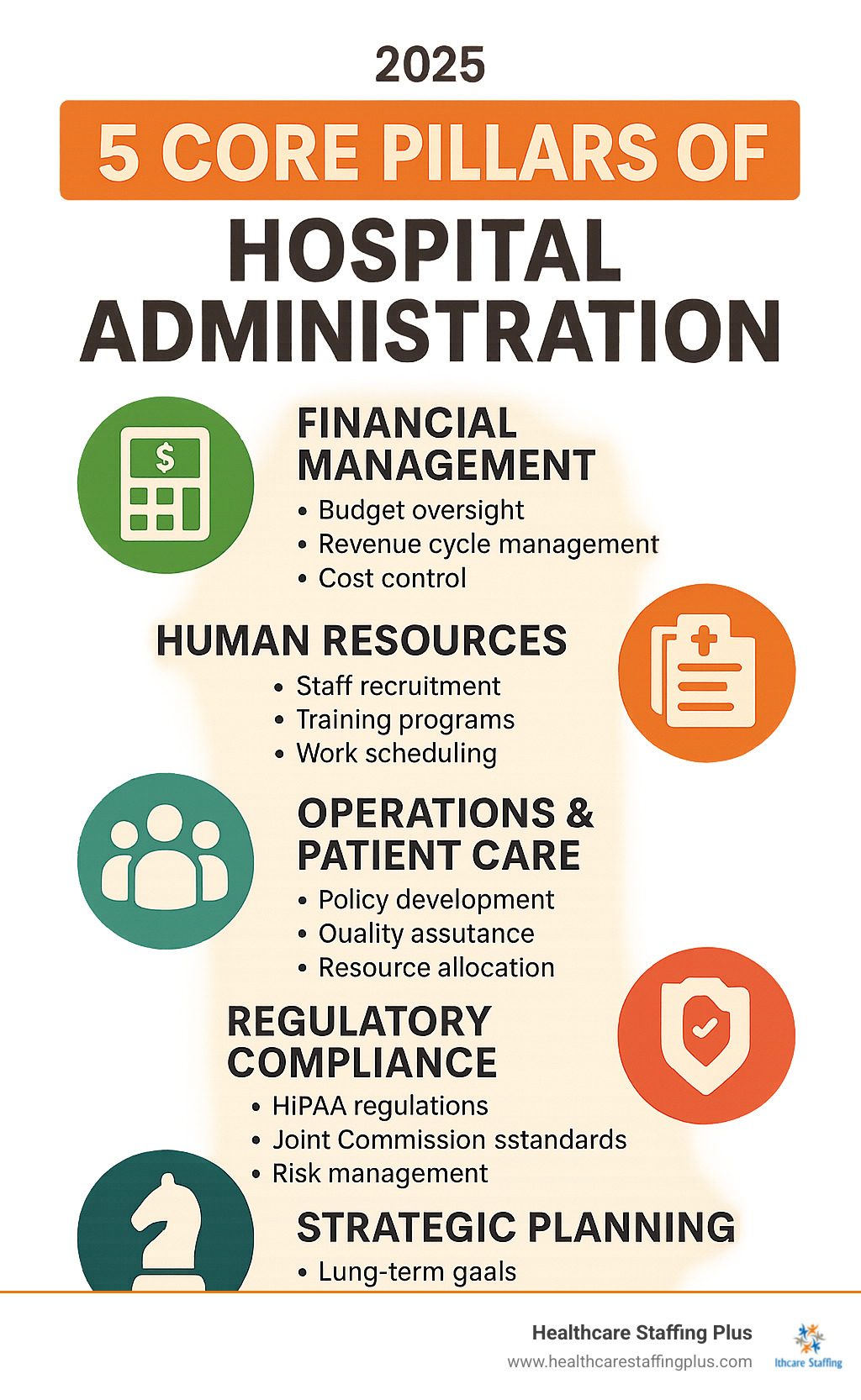
Why Hospital Administrative Officers Are the Backbone of Healthcare
An administrative officer in hospital settings is the operational backbone that keeps care continuous, safe, and efficient. From patient admissions and staffing to budgeting and emergency response, these leaders free clinicians to focus on medicine while they optimize everything else.
Key Hospital Administrative Officer Roles:
- Operations Administrator - 24/7 on-site leadership, crisis coordination
- Admitting Officer - Registration, insurance verification, pre-authorizations
- Department Manager - Finance, HR, or facilities leadership
- Assistant Administrator - Policy rollout and cross-department coordination
In 2023, U.S. hospitals admitted nearly 34 million patients—complexity that demands skilled administration. Demand is rising fast: medical and health services manager jobs are projected to grow 28% from 2022 to 2032, with a median pay of $104,830. The work is high-impact: better operations mean better care, stronger teams, and healthier organizations.

What Does a Hospital Administrator Really Do?

At Healthcare Staffing Plus, we see the hospital administrator as the conductor of a nonstop orchestra—planning, directing, and coordinating services so care is timely, safe, and efficient. Their leadership is a proven lever for Improving Patient Outcomes Through Effective Hospital Administration.
Juggling Finances and Human Resources
An administrative officer in hospital roles manages budgets and the revenue cycle, oversees billing, and pursues cost control without compromising quality. On the people side, they recruit and develop staff, design training, build equitable 24/7 schedules, and maintain healthy labor relations—because great teams drive great care.
Driving Hospital Efficiency and Patient Care
Administrators set policies that work in practice, run quality programs, and act on patient and staff feedback to remove bottlenecks from admission through discharge. They guide resource allocation and choose technologies—from EHRs to devices—that lift safety, throughput, and outcomes.
Ensuring Compliance and Managing Crises
They safeguard compliance with healthcare laws, HIPAA, and The Joint Commission (TJC) standards. In emergencies, they lead risk management, disaster preparedness, and real-time response, making clear, timely decisions that protect patients, staff, and operations.
Your Roadmap to Becoming a Hospital Administrator

Becoming an administrative officer in hospital settings blends education, experience, and credentials.
Step 1: Laying the Educational Foundation
Earn a bachelor’s in healthcare administration (ideal), business administration, public health, or nursing. Core topics include healthcare economics, policy, operations, and management.
Step 2: Gaining Hands-On Experience
Pursue internships or entry roles (administrative assistant, medical records technician, billing). You’ll learn workflows, build practical skills, and grow a network that opens doors.
Step 3: Advancing with a Master's Degree and Certifications
For senior roles, complete an MHA or an MBA with a healthcare focus to deepen leadership, finance, and strategy. Stand out with credentials like CHE or FACHE, which signal expertise and commitment.
The Diverse World of the Administrative Officer in Hospital Settings
The role isn’t one-size-fits-all. From frontline admission to system-wide operations and department leadership, there’s a path for every skill set.
| Role | Key Responsibilities | Required Skills/Background |
|---|---|---|
| Operations Administrator | 24/7 oversight, crisis management, interdepartmental coordination, facility issues | Leadership, crisis management, healthcare operations, calm under pressure |
| Admitting Officer | Registration, insurance verification, pre-auths, patient flow, EHR accuracy | Service mindset, detail focus, insurance/EHR knowledge |
| Department Manager | Budgeting, staffing, policy rollout, compliance within a specialty (finance, HR, facilities) | Department expertise, analysis, team leadership, regulatory fluency |
The Frontline Role of an Admitting Officer
Admitting officers are often the first hospital touchpoint—verifying insurance, securing pre-auths, and ensuring clean data in EHRs to keep patient flow smooth and compassionate.
The Strategic Role of an Administrative Officer in Hospital Operations
Operations administrators provide around-the-clock leadership, coordinate crises, and keep departments synchronized—often acting for the CEO off-hours to maintain safe, continuous care.
The Specialized Role of a Department-Specific Administrative Officer
Specialists in finance or HR go deep on budgets, analytics, compliance, recruitment, training, and labor relations—driving quality and sustainability in their domains.
Why Hospital Administrative Officers Are the Backbone of Healthcare
An administrative officer in hospital settings keeps care running 24/7 by aligning people, processes, and resources.
Key Roles:
- Operations Administrator – on-site leadership and crisis response
- Admitting Officer – registration, insurance, pre-auths
- Department Manager – finance, HR, or facilities oversight
- Assistant Administrator – policy implementation and coordination
U.S. hospitals admitted nearly 34 million patients in 2023. To meet this scale, the field is growing rapidly—jobs for medical and health services managers are projected to rise 28% (2022–2032), with a median salary of $104,830.
What Does a Hospital Administrator Really Do?

Think nonstop coordination. An administrative officer in hospital roles plans, directs, and improves services so patients move safely and efficiently from admission to discharge. Their leadership is linked to better outcomes: see Improving Patient Outcomes Through Effective Hospital Administration.
Juggling Finances and Human Resources
They balance budgets and revenue cycles, seek cost savings, and maintain quality. They also recruit, train, schedule, and support staff, ensuring 24/7 coverage and strong morale.
Driving Hospital Efficiency and Patient Care
Administrators design workable policies, run QA programs, and act on patient/staff feedback. They allocate resources and implement technology (like EHRs) that boosts safety and throughput.
Ensuring Compliance and Managing Crises
They uphold healthcare law, HIPAA, and TJC standards. In emergencies, they lead risk management and disaster response, making time-critical decisions that keep patients and teams safe.
Your Roadmap to Becoming a Hospital Administrator
Three essentials define the journey: education, hands-on experience, and credentials.
Step 1: Laying the Educational Foundation
Complete a bachelor’s in healthcare administration, business, public health, or nursing.
Step 2: Gaining Hands-On Experience
Intern or work in entry roles (admin assistant, records, billing) to learn operations and build a network.
Step 3: Advancing with a Master's Degree and Certifications
Pursue an MHA or healthcare-focused MBA and add CHE or FACHE to signal advanced competency.
The Diverse World of the Administrative Officer in Hospital Settings
Hospital administration spans frontline service, 24/7 operations, and department leadership. Whether you thrive in patient interaction, crisis coordination, or specialized analytics, there’s a role that fits.
- Admitting Officer: registration, insurance, pre-auths, patient flow, EHR
- Operations Administrator: off-hours leadership, crisis management, coordination
- Department Manager (Finance/HR/Facilities): budgets, staffing, compliance, policy
Why Hospital Administrative Officers Are the Backbone of Healthcare
These leaders turn complexity into coordinated care. Core roles include operations, admitting, department management, and assistant administration. With nearly 34 million U.S. hospital admissions in 2023 and projected 28% job growth (2022–2032), the field offers impact and stability (median $104,830).
What Does a Hospital Administrator Really Do?
Hospital administrators plan, direct, and coordinate services across departments, improving care quality and efficiency. Their leadership is tied to better outcomes: Improving Patient Outcomes Through Effective Hospital Administration.
In practice, they manage budgets and staffing, lead process improvement and technology adoption, uphold HIPAA and TJC standards, and direct emergency response.
Your Roadmap to Becoming a Hospital Administrator
- Education: Bachelor’s in healthcare administration (or business/public health/nursing)
- Experience: Internships or entry roles to learn workflows and build a network
- Advancement: MHA or healthcare MBA plus CHE/FACHE certifications for senior roles
The Diverse World of the Administrative Officer in Hospital Settings
Choose your lane:
- Frontline (Admitting Officer): empathetic intake, insurance, EHR accuracy, patient flow
- Operations (Operations Administrator): 24/7 leadership, crisis coordination, cross-department liaison
- Specialized (Department Manager): finance or HR expertise, budgeting, staffing, compliance
Why Hospital Administrative Officers Are the Backbone of Healthcare
An administrative officer in hospital settings keeps teams aligned and patients moving safely. Roles span operations, admitting, department management, and executive support. With 28% projected growth (2022–2032) and a $104,830 median wage, it’s a high-impact, high-opportunity career.
What Does a Hospital Administrator Really Do?
They blend strategy and operations: stewarding budgets, staffing, policies, quality programs, and technology. They also ensure HIPAA/TJC compliance and lead risk and disaster response—all to deliver efficient, patient-centered care.
Your Roadmap to Becoming a Hospital Administrator
Start with a relevant bachelor’s, gain practical hospital experience, then level up with an MHA or healthcare MBA and certifications like CHE or FACHE to compete for senior leadership roles.
The Diverse World of the Administrative Officer in Hospital Settings
From welcoming patients to steering strategy, admins work where their strengths fit best. Admitting focuses on patient intake and insurance; operations delivers 24/7 leadership; finance/HR managers build sustainable budgets, teams, and compliance.
The Diverse World of the Administrative Officer in Hospital Settings
Hospital administration offers multiple paths: frontline service, operational leadership, and department specialization. Whatever your strengths—people skills, crisis management, or analytics—there’s a role that advances both your career and patient care.
